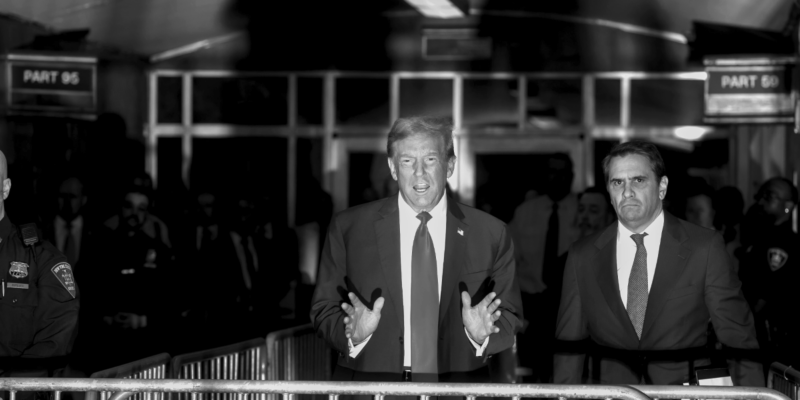
The justice system finally caught up with Individual-1—a.k.a. Donald J. Trump.
On the opening day of Trump’s historic trial for his porn-star-hush-money caper—no former president has ever been on trial for criminal charges—New York Supreme Court Judge Juan Merchan had to clear up a few pending legal issues before moving to the arduous task of selecting jurors. One of those matters concerned the criminal case of onetime Trump fixer Michael Cohen, who, according to filings submitted by federal prosecutors, broke the law at the behest of a person identified as “Individual-1.”
The immediate question for Merchan was whether and how prosecutors in New York District Attorney Alvin Bragg’s office could refer to Cohen’s 2018 guilty plea for violating election law. Cohen was nabbed for making the illegal in-kind contribution to Trump’s 2016 campaign at the center of this case: the $130,000 payoff to Stormy Daniels to keep mum about her alleged affair with Trump. He will be a key witness for Bragg.
Both sides have been arguing over what can and can’t be said about that guilty plea during this trial. To discredit Cohen, Trump’s lawyers want to cite Cohen’s other guilty pleas (tax evasion, making false statements to a bank, and lying to Congress), which were unrelated to the Daniels affair. But they’d rather jurors not hear about Cohen’s plea regarding the hush-money deal because that would reinforce the idea that the payment to Daniels was a felony. To win this case, Bragg’s team must prove that Trump falsified business records—that is, recorded the $130,000 payment as a legitimate legal expense for the Trump Organization—and did so to cover up a felony. The prosecutors, naturally, want the jury to know that the federal court that tried Cohen has determined the payment was a felony violation of campaign law. Trump’s defense team is expected to contend Cohen’s payment was not an election law violation.
The back and forth on this is a reminder of a fact often lost in all the hubbub about the Trump-Daniels case: The feds identified Trump as a co-conspirator in the crime Cohen committed.
In December 2018, lawyers in the office of the US attorney for the Southern District of New York filed a sentencing memo following Cohen’s guilty pleas. The document referred to Cohen’s arrangement of the payment to Daniels, as well as a financial deal the National Enquirer made with Karen McDougal, a former Playboy model, to keep her quiet about her alleged extramarital romance with Trump. Here is a passage from the memo:
During the [2016] campaign, Cohen played a central role in two similar schemes to purchase the rights to stories —each from women who claimed to have had an affair with Individual-1—so as to suppress the stories and thereby prevent them from influencing the election. With respect to both payments, Cohen acted with the intent to influence the 2016 presidential election. Cohen coordinated his actions with one or more members of the campaign, including through meetings and phone calls, about the fact, nature, and timing of the payments. In particular, and as Cohen himself has now admitted, with respect to both payments, he acted in coordination with and at the direction of Individual-1. As a result of Cohen’s actions, neither woman spoke to the press prior to the election.
At the direction of Individual-1. That’s the key line. As other parts of the memo show, “Individual-1” was Trump. With this filing, the feds were clearly stating that Trump and Cohen were in cahoots in this criminal venture.
Yet the US attorney’s office never pursued Trump for his role in the crime. At the time of Cohen’s prosecution, Trump was president, and Justice Department policy prohibited the indictment of a sitting president. (Legal experts have long debated whether this policy ought to stand.) And by the time Trump left office, the federal investigation of the hush-money payment was moribund. In his 2022 book, Holding the Line, Geoffrey Berman, the former US attorney for the Southern District, suggested that the Trump Justice Department had tried to stifle this inquiry. (Berman did not work directly on this case).
Once again, Trump was off the hook. Meanwhile, Cohen went to prison for a crime that Trump instructed him to commit but was not held accountable for. Now, Trump’s involvement in the hush-money payment is a central component in his own criminal case.
In the run-up to the trial, prosecutors have argued they would like to inform the jury of Cohen’s guilty plea not to suggest Trump is guilty, but to enhance Cohen’s credibility—essentially by showing that he ‘fessed up to his crime. Merchan said okay, as long as Bragg’s lawyers lay the appropriate foundation. The judge asked each side to draft instructions for the jury stating that the jurors could make no inferences about Trump’s guilt because of Cohen’s guilty plea. Obviously, the more Bragg’s attorneys can bring Cohen’s case into this one, the stronger their own argument will be—and the greater the odds that Individual-1 will not escape yet again.
From outside the Manhattan courthouse where Donald Trump made history today by becoming the first former president to face a criminal trial.pic.twitter.com/gfHaXi44os
— David Corn (@DavidCornDC) April 15, 2024















